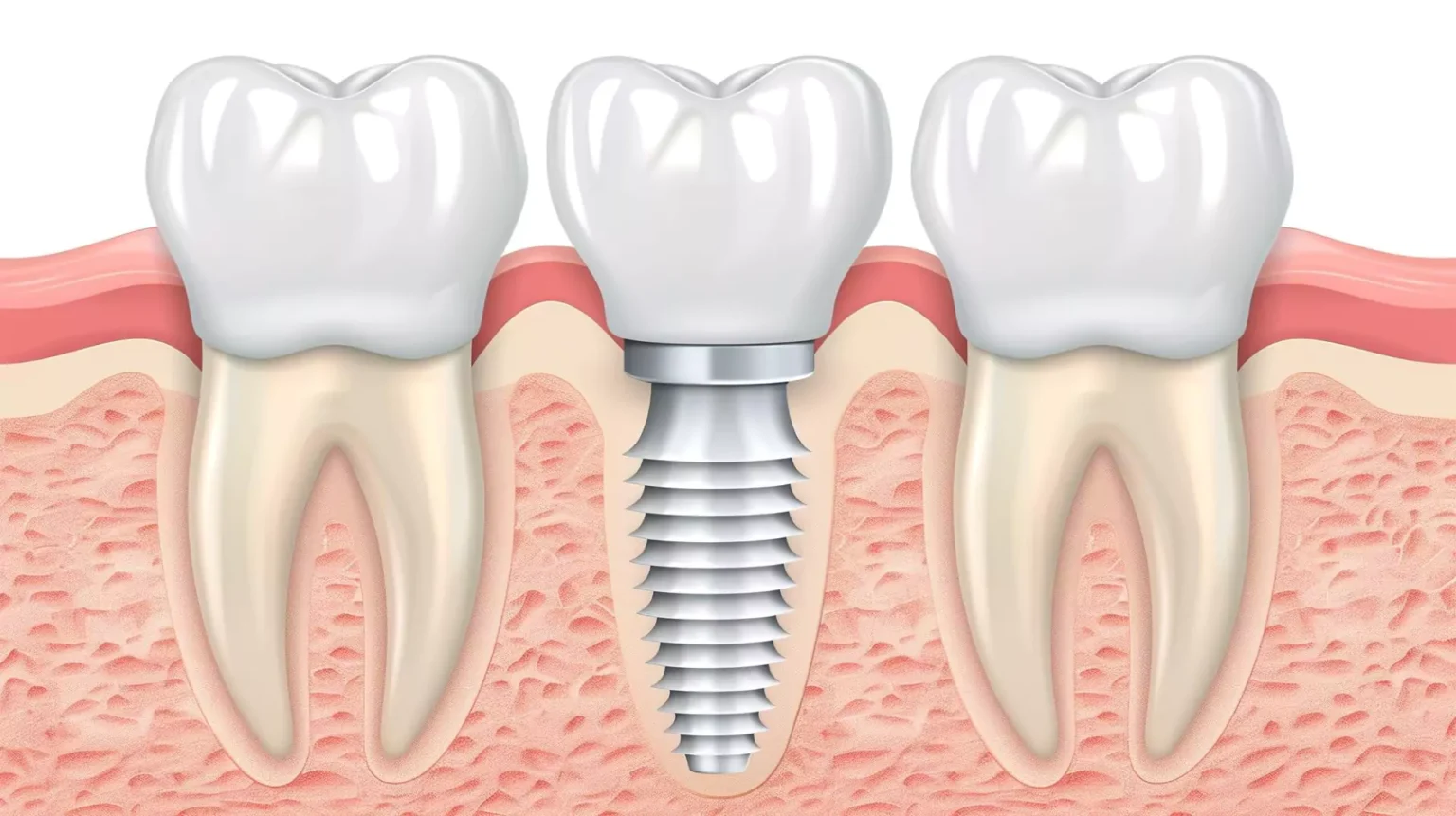This blog explores the lifespan of dental implants, focusing on key factors influencing their durability like oral hygiene, bone health, and lifestyle choices. It also provides tips for maximizing the longevity of dental implants through proper care routines, regular check-ups, and avoiding harmful habits.
With proper care, dental implants can last a lifetime, though the implant-supported crown or prosthesis will likely need replacement after 10-15 years. Dental implants can last a lifetime if they are properly maintained, including regular dental visits, brushing, and flossing.
What are Dental Implants?
Dental implants are artificial tooth roots made of biocompatible materials, typically titanium, that are surgically placed into the jawbone to support replacement teeth or bridges. Here’s how they work:
You can also read about Dental Implants Vs. Bridges here
- Implant Placement: A titanium post is inserted into the jawbone during a surgical procedure, acting as a substitute for the tooth root.
- Osseointegration: Over a few months, the bone grows around the implant, anchoring it securely.
- Abutment Attachment: A connector piece called an abutment is attached to the implant, serving as the base for the replacement tooth.
- Crown Placement: A custom-made crown is attached to the abutment, completing the restoration.
Dental implants are popular for their durability and natural appearance and can replace single or multiple teeth depending on individual needs.
Click here to know more about the types of dental implants.
How Long Do Dental Implants Last? Are Dental Implants Permanent?
Dental implants are designed to be a long-lasting solution, typically lasting 10 to 15 years, and often much longer with proper care. While they are not considered “permanent” in the strictest sense, their longevity can be influenced by factors like oral hygiene, bone health, and lifestyle habits. Regular dental check-ups and maintenance are crucial for maximizing their lifespan.
Factors Affecting the Lifespan of Dental Implants
1. Inexperienced Dental Surgeon
An inexperienced dental surgeon can impact the lifespan of dental implants significantly:
- Improper Placement: Incorrect positioning can lead to poor osseointegration.
- Inadequate Bone Preparation: Insufficient support for the implant increases the risk of complications.
- Infection Risk: Inexperienced handling may lead to a higher risk of infection.
Choosing a skilled and experienced dental surgeon is crucial for the successful placement and longevity of dental implants.
Visit AO dentistry in pune for the best treatment of dental implants.
2. Bone Density
Bone density plays a crucial role in the success and longevity of dental implants:
- Implant Stability: Sufficient bone density ensures the implant integrates securely.
- Successful Integration: Adequate bone density supports proper healing and reduces implant failure risk.
Maintaining good bone health is essential for the long-term success of dental implants.
3. Medical Conditions that Influence the Lifespan of Dental Implants
Several medical conditions can impact the lifespan and success of dental implants:
- Diabetes: Poorly controlled diabetes can impair wound healing.
- Osteoporosis: Reduced bone density may require additional procedures like bone grafting.
- Autoimmune Disorders: Conditions like rheumatoid arthritis can influence healing.
- Periodontal Disease: Chronic gum disease can lead to bone loss around the implant.
- Smoking: Smoking impairs oral health and healing.
Addressing these conditions with your healthcare provider can improve the chances of successful implants.
4. The Brand of Dental Implant and Material
The brand and material of the implant affect its lifespan:
- Brand: Established brands with a strong track record often produce higher-quality implants.
- Material: Titanium is the most common material due to its biocompatibility and durability. Zirconia is an alternative that is also biocompatible but may be more prone to fractures.
5. Lifestyle and Habits
Lifestyle and habits significantly influence the lifespan of dental implants:
- Oral Hygiene: Brush regularly and floss daily. Regular professional cleanings are essential.
- Diet and Nutrition: Maintain a balanced diet and avoid excessively hard or sticky foods.
- Smoking and Alcohol: Smoking impairs healing, and excessive alcohol can impact oral health.
- Habits: Teeth grinding and jaw clenching can put stress on implants. Consider using a nightguard if necessary.
6. Age of the Person
Age can impact the success of dental implants:
- Younger Patients: Implants are typically placed after bone growth is complete. Younger patients usually have a faster healing process.
- Middle-Aged Adults: Bone density generally supports implant stability, but health conditions may arise.
- Older Adults: Bone density can decrease with age, and chronic health conditions need to be managed carefully.
7. Ongoing Medications
Certain medications can affect the success of dental implants:
- Antibiotics: Used to prevent or treat infections.
- Bisphosphonates: Used for osteoporosis but can affect bone healing.
- Anticoagulants: May increase bleeding; consult with a healthcare provider before surgery.
- Immunosuppressants: Can impair healing and increase infection risk.
- Steroids: Long-term use can affect bone density and healing.
- Medications Affecting Bone Density: Can influence implant success; monitor bone health.
8. Previous Treatments
Previous treatments can impact implant success:
- Bone Grafting: Augments bone structure for implant placement.
- Sinus Lifts: Used when there is insufficient bone in the upper jaw.
- Periodontal Treatments: Address gum disease to ensure the health of supporting tissues.
Here are the benefits of dental implants.
How Long Do Mini-Implants Last?
Mini dental implants, smaller in diameter than traditional implants, generally last 5 to 10 years. They are designed to stabilize dentures or serve as temporary solutions. While their success rate is lower than standard implants, many patients experience successful outcomes.
How Long Do Zirconia Implants Last?
Zirconia dental implants typically last 10 to 20 years. Their durability is influenced by:
- Bone Quality: Adequate bone density supports long-term stability.
- Oral Hygiene: Good oral care is crucial.
- Placement and Technique: Proper placement is key.
- Lifestyle Habits: Avoid smoking and manage teeth grinding.
With proper care and regular check-ups, zirconia implants offer a durable and aesthetic solution for many patients.
You can also read about Dental Lasers here.
What Happens If an Implant Fails?
When a dental implant fails, it can have several consequences:
- Health and Functional Consequences: Pain, discomfort, and potential infection can affect daily activities. Loss of function may impact chewing or speaking.
- Emotional and Psychological Impact: Failure can lead to stress, anxiety, and decreased self-esteem.
- Financial Consequences: Additional costs for removal, grafting, and new implants may be incurred.
- Treatment and Recovery: Failure may require extended recovery time and additional procedures.
- Impact on Oral Health: Further bone loss and tissue damage may occur.
Tips for Extending the Lifespan of Dental Implants
- Maintain Excellent Oral Hygiene: Brush twice a day and floss daily.
- Regular Dental Checkups: Schedule checkups and professional cleanings regularly.
- Avoid Hard or Sticky Foods: Avoid biting into hard foods and steer clear of sticky items.
- Stop Smoking: Smoking impairs healing and increases risk.
- Use a Nightguard if Necessary: Protect against grinding and clenching.
- Maintain a Healthy Lifestyle: Eat a balanced diet and stay hydrated.
- Avoid Excessive Alcohol Consumption: Limit alcohol to avoid negative impacts on oral health.
- Monitor Bone Health: Ensure adequate bone support and address any issues with your dentist.
By following these guidelines, you can help ensure your dental implants remain healthy and functional for many years.
Wanna know about Dental Implant Parts? Click for more insights.
FAQs
How many times can a dental implant be replaced?
An implant can be replaced if necessary, but ideally should last a long time with proper care.
Can dental implants last a lifetime?
Yes, with good oral hygiene and regular checkups, dental implants can last a lifetime.
What happens to dental implants after 20 years?
Implants can still be functional after 20 years if well-maintained, but monitoring for any changes in bone and gum health is essential.
What is the age limit for dental implants?
There is no strict age limit; suitability depends on overall health and bone density.
Can I get an implant 10 years later?
Yes, you can get an implant 10 years later, provided you have good oral health and adequate bone density










